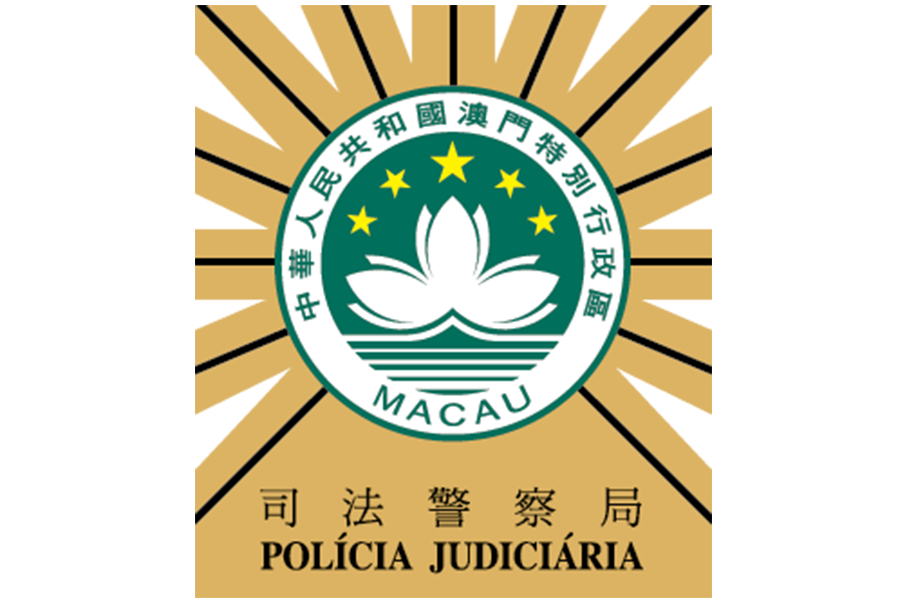Yuki Lei in Malaysia
A business delegation of the Macao ASEAN International Chamber of Commerce (MAICC) visited the Johor State Government of Malaysia yesterday and toured the R&F Princess Cove and RTS (Rapid Transit System) railway projects there, and MAICC Chairman Kelvin Tan Hai Ching said he expected the delegation members to deepen their knowledge and grasp the business opportunities before the Johor-Singapore Special Economic Zone (JS-SEZ) is established, making full preparations for their future investments in the large-scale undertaking.
With the rapid changes in the global economy in recent years, the traditional strengths in manufacturing, medical equipment, electronics and electrical appliances remain an important basis for cooperation between Southeast Asia economies, particularly between Johor and Singapore. As an important result of the cooperation between Malaysia and Singapore, Johor State Executive Council Member and Chairman of the Investment, Trade, Consumer Affairs and Human Resources Committee Lee Ting Han told the delegation during yesterday’s meeting that the Johor-Singapore Special Economic Zone will play a pivotal role in fostering closer economic integration between the two countries and attracting various types of investment.
According to Lee, the state of Johor is the third most economically developed state in Malaysia, with a total area of 19,166 square kilometres and a population of about four million. He underlined that the state has the second-largest petrochemical industry in Southeast Asia, as well as a relatively well-developed semiconductor industry, adding that the manufacturing of medical equipment and furniture is also a traditional strength of the state situated in the south of the Malay peninsula.
Taking into account the resources, geography and manpower of Singapore and Johor, Lee said, there is tremendous potential for economic development in the region, especially in the Southeast Asian market, where the growing population is getting younger.
In order to promote close cooperation between Malaysia’s Johor and Singapore, Lee noted, both sides put forward the idea of establishing the Johor-Singapore Special Economic Zone last year and conducted several rounds of negotiations this year, with plans to formally launch the project at the end of the first quarter of next year, covering 16 areas such as electronics and electrical, medical, pharmaceuticals, aviation, specialised chemicals and logistics, striving to achieve interconnectivity and interoperability.
Lee also said: “With the gradual advancement of the Johor-Singapore Special Economic Zone, new opportunities for economic cooperation between Johor and Singapore will arise. In the future, the Johor-Singapore Special Economic Zone will not only bring economic growth to the two countries but will also provide a strong impetus for the development of the entire Southeast Asian market.”
Speaking to the Post and Macao Daily News – Macau’s top-selling English- and Chinese-language newspapers, respectively – after the meeting with Lee, Tan said that the success of economic zones can be traced back to Shenzhen, where the city has become a model thanks to its flexible economic policies and regional cooperation, adding that with the establishment of the Johor-Singapore Special Economic Zone (JS-SEZ) in southern Malaysia’s Iskandar development corridor, both countries are holding on to the experience of Shenzhen and hoping to find a suitable path for their development by learning from it.
Tan pointed out that the free movement of people between two regions or countries is one of the key factors for the success of an economic special zone, suggesting Malaysia follow suit and introduce a “blue card” policy similar to that of Macau, to ensure that workers can move between the places with ease.
Tan said he believed that such a policy arrangement could maximise the potential of human resources and promote economic interaction within the region.
With the introduction of new policies and further upgrading of infrastructure, Tan said he expected the upcoming special economic zone, which, he stressed, was poised to become an economic cluster that attracts investment, facilitates the flow of talent, and strengthens regional connectivity, so that it would be able play an even more significant role in the economic development of Southeast Asia.
Organised by the MAICC, over 40 representatives of the Guangdong-Hong Kong-Macau Greater Bay Area (GBA), Macau in particular, embarked on their six-day fact-finding trip to Singapore and Malaysia on Thursday.
The delegation ended their three-day trip to Singapore on Saturday, during which they visited United Overseas Bank Venture Management (UOBVM) Private Limited, the Chinese embassy, the New Bahru creative cluster and the Orchard Road Station of the Thomson-East Coast Line in the Lion City. (More on our website https://www.macaupostdaily.com/)
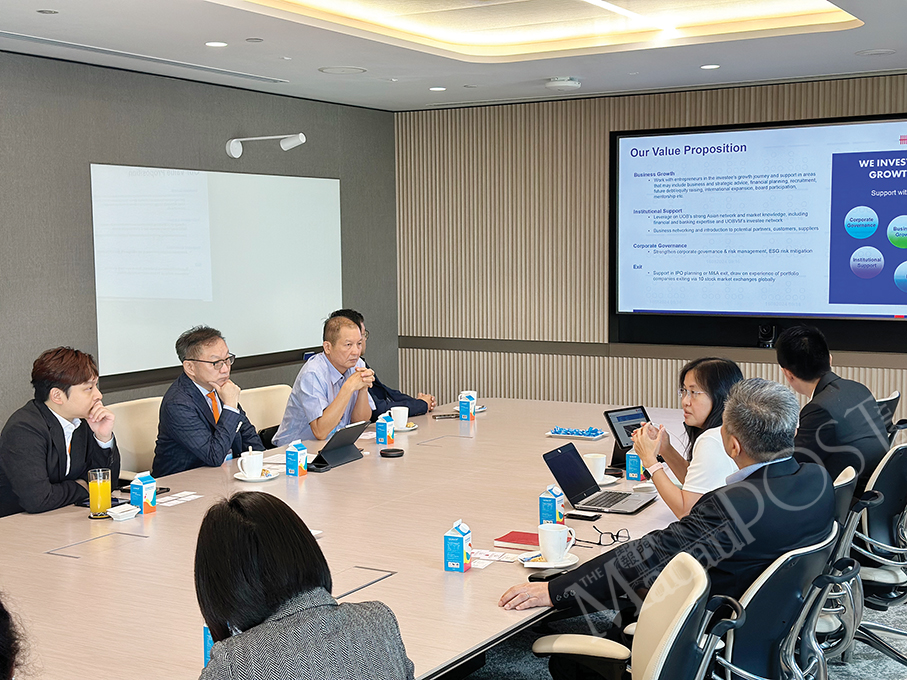
Members of the Macao ASEAN International Chamber of Commerce (MAICC) visit UOBVM Private Limited in Singapore on Friday, the second day of their six-day fact-finding trip to the Lion City and Malaysia’s Johor Bahru.
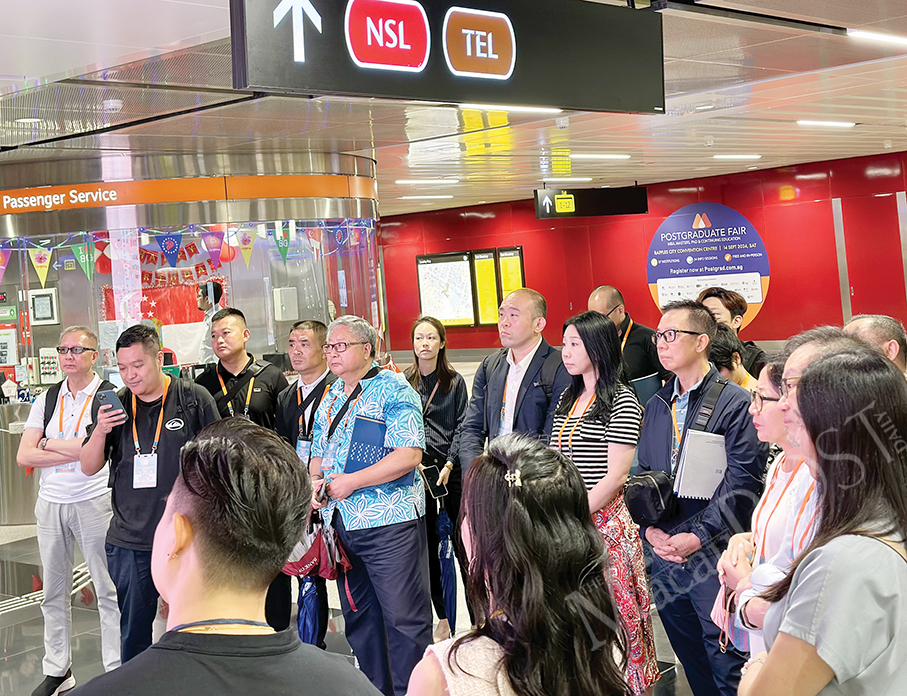
Members of the Macao ASEAN International Chamber of Commerce (MAICC) visit the Thomson-East Coast Line in Singapore on Saturday.
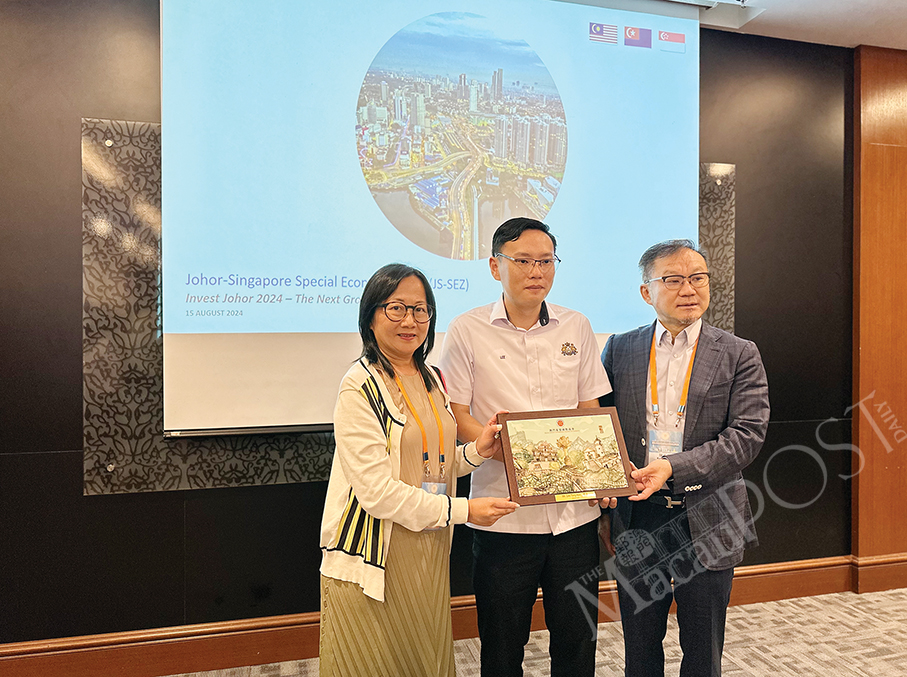
MAICC Chairman Kelvin Tan Hai Ching (right) and Director General Joyce Wong Yuk Sze (left) pose with Johor State Executive Council Member and Chairman of the Investment, Trade, Consumer Affairs and Human Resources Committee Lee Ting Han after yesterday’s meeting regarding the future development of the Johor-Singapore Special Economic Zone (JS-SEZ) in Malaysia’s Iskandar development corridor.
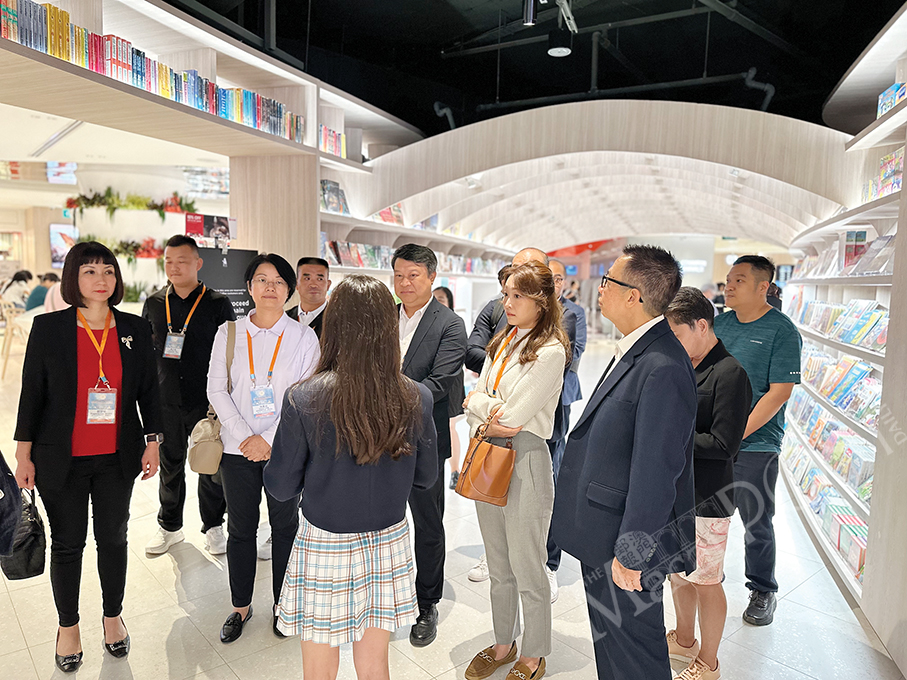
MAICC Delegation members visit the Lion City’s OCBC Bank Wisma Atria on Friday. – Photos: Yuki Lei




